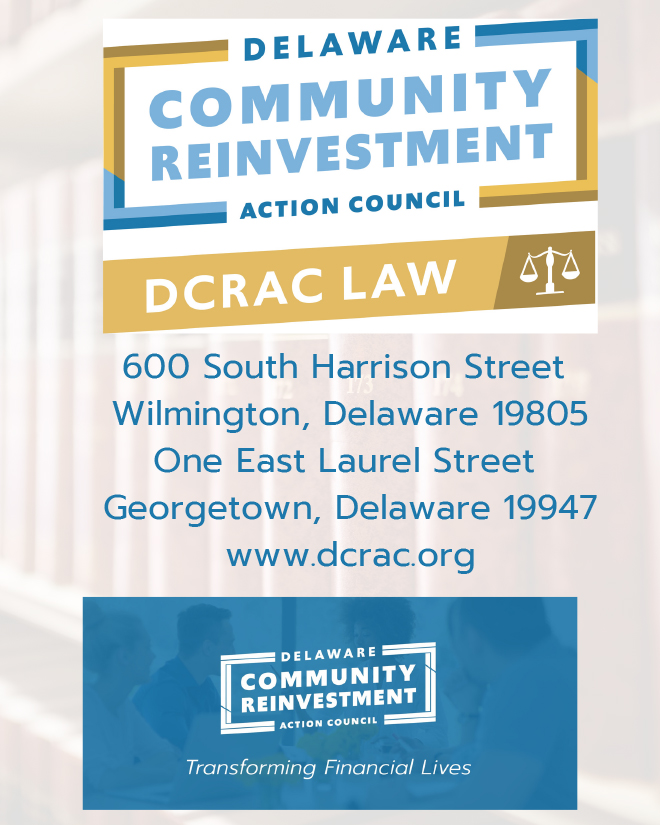Older Parent? Don’t Delay These Steps

By Jaclyn Quinn, Esq.
Delaware Community Reinvestment Action Council, Inc.
Taking care of an aging parent can be a full-time job, from doctor’s appointments and paying bills to grocery shopping and more. For many, the list never ends—whether your parent still lives independently or not. While each person’s individual circumstances come with their own challenges, getting your family’s legal affairs in order is essential in every case.
That starts with “capacity”—the ability to understand what someone is signing when it comes to legal procedures. For various reasons and at varying rates, capacity declines as we age, so working with your parent if they still have capacity to sign makes securing the following documents a lot simpler.
An Advance Health Care Directive appoints a healthcare agent to assist with coordination of medical needs and end of life decisions, in the event someone no longer has capacity to make necessary medical decisions. Your parent can grant one or more individuals to serve as their agent.
Clients often tell me they don’t need this document—I frequently hear a variation of, “We’ve gone to the same family doctor for years; they know us, and Mom said it was fine for them to speak to me.” That informal arrangement may work in the short term or for more minor issues, but not for the big stuff. If your parent ends up in the hospital, needs a specialist, or requires longer-term or expensive treatments, their caregiver might not have authority, and they may not have capacity to sign.
By all means, consult your doctors for advice—but don’t depend solely on them in a crisis. Getting an AHCD in place sooner rather than later ensures the patient’s chosen authority is there, just in case.
A Durable Power of Attorney designates an agent for all financial matters in the event someone becomes incapacitated and can no longer manage their own finances. As with the AHCD, the formal grant of authority sounds minor but can matter greatly.
Here again, some clients tell me that they just plan to use their parent’s online banking account to continue paying bills as needed, or perhaps they have bills on autopay and don’t think they need this type of document. But if their parent loses capacity and truly needs assistance—such as filing taxes, withdrawing funds for nursing care, or signing an agreement for a company to retro-fit their home—you could run into legal road blocks quickly, and lose access to the accounts and funds.
It’s not worth the gamble. The Durable POA is a simple form that could save lots of time, money, and headaches in the future.
The Last Will and Testament is crucial upon a loved one’s passing (whereas the AHCD and Durable POA are very important during their lifetime). This set of documents opens an estate, appoints an Executor for it, and instructs them how to distribute any assets, from finances to personal possessions to property.
A will and testament must be executed while your parent is of sound mind and still has capacity—once they lose that, it will be too late to get things in place. The lack of an estate plan can also create a whole host of other problems after someone’s death.
These documents are just the start when it comes to financial and legal planning. As a caregiver, you must also learn what your parents’ debts and assets are, where they keep their existing documents, and if they’ve made prepayments for funeral (and, if so, where that information is). If they have a financial advisor already, know how to get in touch.
I meet with too many families who face complicated, tough situations because they have their hands tied when a parent passed without a will, or authority over their care is taken away. Sorting through all of this helps everyone in the long run. The conversations may not be easy, but a good caregiver needs these tools and information, and having this planning in place early can provide some comfort, too.
Take these important steps as soon as you can! If your situation is more complicated, contact DCRAC Law at www.dcrac.org to get the assistance your family might need. Jaclyn Quinn is licensed to practice law in Delaware. She and her colleagues at the Delaware Community Reinvestment Action Council are available to assist. For more information, or to schedule a consultation, please call (302) 298-3251 or email Jaclyn at [email protected].
Bio
Jaclyn Quinn, Esq. joined the Delaware Community Reinvestment Action Council (DCRAC) in 2011, first as a volunteer, then as staff. In 2014 Jaclyn opened and grew her private practice until 2019, when DCRAC Law opened to the community. DCRAC Law is a nonprofit law firm providing tax, title, and other legal services to those unable to pay market rates.
Jaclyn graduated with a B.A. in Political Science from The College of New Jersey before moving to Delaware to pursue her J.D. at Widener University- Delaware Law School. She was admitted to the Delaware Bar in 2012, and is also barred in U.S. Tax Court and U.S. Immigration Court. She has volunteered with the Office of the Child Advocate, DVLS, and assists as pro bono counsel in a variety of cases. Jaclyn is a member of the Howard High School Academy of Finance Advisory Board.


